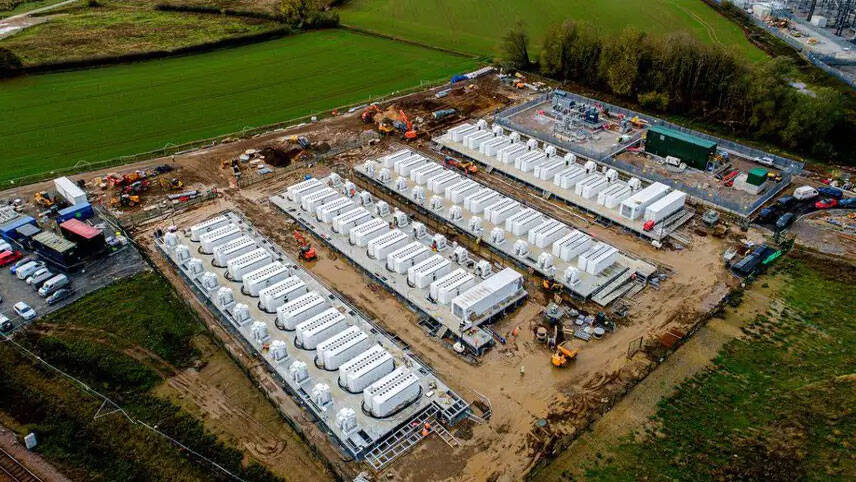Register for free and continue reading
Join our growing army of changemakers and get unlimited access to our premium content

Image: Harmony Energy. Pictured: Battery energy storage in Cottingham
The Energy Networks Association (ENA) posted the milestone on Tuesday (15 August) in new data tables on energy flexibility tenders and contracts covering the 12 months leading up to August 2023.
The data confirms that 4.6GW of flexibility was tendered during the year, of which 2.4GW was actually contracted.
For context, the UK’s average daily energy demand over the past 12 months has been 29.4GW.
Of the flexibility capacity contracted during the year, just 19% was accounted for by fossil fuels – mainly gas peaker plant capacity.
One-third was attributable to stored energy, predominantly in batteries. The ENA does not track the generation source of this stored energy. Most of the remainder is attributable to renewable energy.
Flexibility was also contracted in the form of demand reduction, whereby payments are made to energy users that reduce their energy consumption or totally switch off at times of high demand. Demand reduction trials involving the general public were used for the first time this winter and proved to be popular.
The ENA has tracked data on flexibility tenders and contracts since 2018. It has recorded steep growth in the market; in 2019, 1.3GW was tendered, of which just 256MW was contracted.
Flex appeal
Unlocking flexibility is regarded as crucial to delivering the UK’s energy transition. As more intermittent renewable generation comes online, assets like batteries and water can be used to ensure energy security at times of high demand but low generation.
The UK is notably aiming to end coal-fired electricity generation in 2024 and end unabated gas-fired electricity generation by 2035. It has repeatedly been urged to put forward clearer plans for delivering this latter pledge.
The ENA’s head of open networks Avi Aithal said that while the UK’s flexibility market has come far in a short period, becoming one of the largest in the world, more work is needed to scale the market rapidly in the future.
Aithal said: “The Government’s and Ofgem’s support for the ENA’s Open Networks programme has been invaluable and we look forward to continuing to work closely with them.
“It’s been a tremendously exciting time for the scheme as we have been focused on making flexibility accessible to everyone in the UK, which is vital to helping the UK meet our net-zero goals at the least cost to customers.”
Earlier this month, the Association for Decentralised Energy (ADE) urged the UK Government to ensure that ongoing reforms to the UK’s electricity market help to unlock an unprecedented scaling of low-carbon technologies that provide flexibility services.
It is particularly keen to see balancing mechanisms altered to favour low-carbon technologies over fossil fuels, encouraging operators to transition away from gas peaking. Mechanisms should also make it easier for large and small projects alike to participate in the market.
ADE policy manager for flexibility, Sarah Honan, said: “An exponential increase in low carbon flexibility is the only path for reaching net-zero in a cost-effective way. Certainty of direction, consistency of delivery, and when the time comes, clarity of design will provide industry and other stakeholders with the confidence needed to invest in flexibility.”
Related news: Plans approved for world’s largest battery storage scheme in Manchester


Please login or Register to leave a comment.